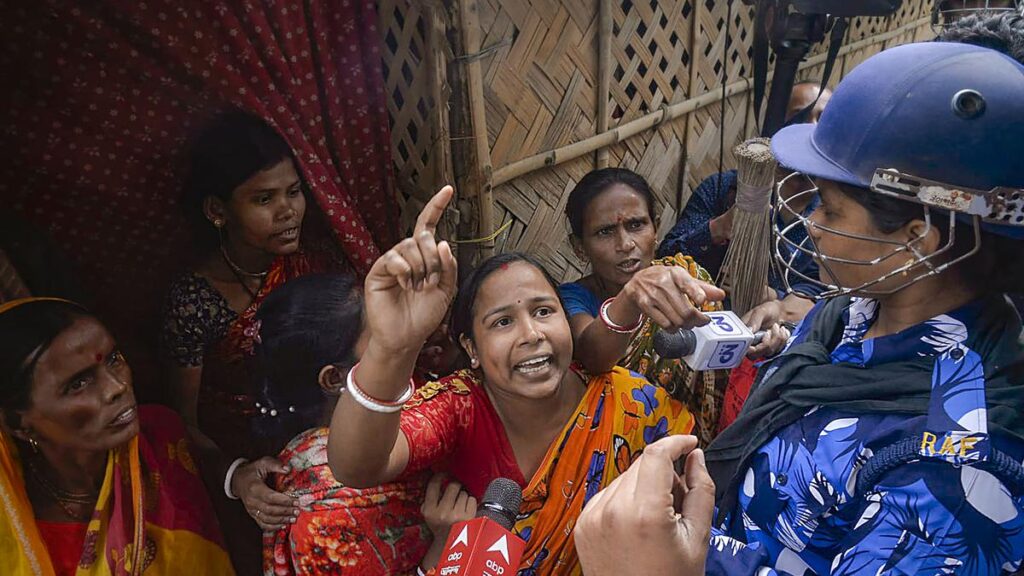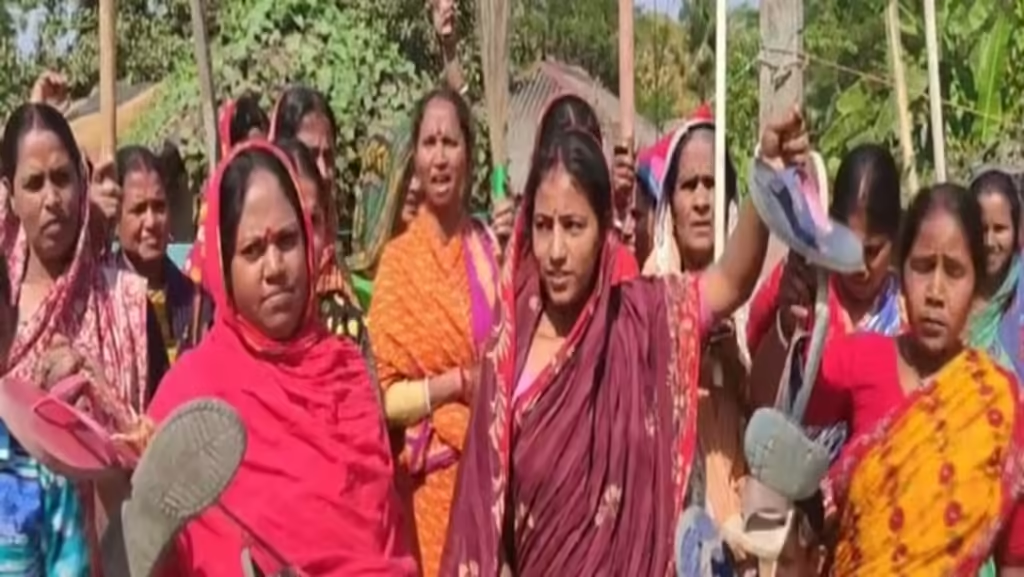
Sandeshkhali, a once quiet village in West Bengal’s North 24 Parganas district, has recently become a battlefield of fear, courage, and political unrest.
The town is now synonymous with the alarming allegations against local Trinamool Congress (TMC) leader Shahjahan Sheikh and his associates. These men are accused of committing vile acts of sexual harassment and land grabbing, plunging the community into chaos and igniting violent protests.
The trouble began on a freezing January morning, January 5, 2024, when the Enforcement Directorate (ED) arrived to raid Shahjahan Sheikh’s residence. They were investigating a multi-crore public distribution system scam.
However, the operation quickly turned violent as Sheikh’s loyal followers attacked the ED officials, preventing them from entering his home. The officials barely escaped, stressing the extent of Sheikh’s control and the violent means he employed to maintain his hold on power.
In the aftermath, Sheikh went into hiding, leaving behind a community consumed in rage and fear.
A month later, on February 7, the women of Sandeshkhali, who had survived years of torture, decided enough was enough. Armed with bamboo sticks and brooms, they took to the streets in protest. Their stories were harrowing.
For over a decade, these women had been systematically abused. Lured to TMC offices under false pretences, they were sexually assaulted.
Resistance was met with threats and harassment, not just against them but their families as well. These brave women, driven by years of silent suffering, found their voices and demanded justice.

RELATED: How rape survivors in India end up marrying their rapists
Allegations of systematic abuse
One cannot overstate the seriousness of their allegations. The women described a calculated campaign of abuse where TMC men would scout for attractive women, particularly young wives or girls, and forcibly take them to the party office. There, they would be held captive and subjected to sexual exploitation.
The community lived in constant fear. Men were often forced to leave the village to escape the ruthless abuse and seek safety and employment elsewhere. The women’s courage in coming forward was monumental, given the influential figures they were up against.
In response to the growing outrage, West Bengal’s Director General of Police (DGP), Rajeev Kumar, announced the formation of a special 10-member committee led by two Deputy Inspector General (DIG) rank women officers to investigate the claims.
Seventeen arrests were made concerning the case, and the police urged more villagers to come forward with their complaints. However, the community’s trust in the authorities remained fragile, given the scale and duration of the abuses.
The political ramifications were immediate and intense. Opposition parties, including the BJP, CPIM, and Congress, accused the ruling TMC government of shielding Sheikh and his men. They demanded swift and decisive action.
Tensions rose when women protesters burned down three poultry farms owned by another implicated TMC leader, Shibaprasad Hazra, claiming the land had been forcibly seized from local villagers.
The situation drew the attention of West Bengal Governor CV Ananda Bose, who cut short a trip to Kerala to visit Sandeshkhali. His visit was a turning point.
Describing the scenes as “ghastly, shocking, and shattering,” Bose’s condemnation was stark. He submitted a detailed report to the Ministry of Home Affairs, accusing local law enforcement of collusion with the perpetrators. This report stressed the urgent need for a thorough and impartial investigation.
Chief Minister Mamata Banerjee, under intense scrutiny, stated that those responsible had been arrested and that the situation was being closely monitored. However, her assurances did little to pacify the growing unrest.
The Calcutta High Court intervened, revoking the imposition of Section 144 in Sandeshkhali, which had been used to prevent large crowds, and called for increased security measures, including surveillance through drones and CCTV cameras.

RELATED: The Story of Sajal Barui: Teen Who Killed Entire Family, Partied in Jail, and Is Now a Free Man
Seeking justice
Various commissions, both state and national, sought to discover the truth. The state Women’s Commission and the National Commission for Scheduled Castes (NCSC) dispatched delegations to Sandeshkhali to speak directly with the affected women.
Despite facing obstacles from local police, who cited prohibitory orders to prevent visits, these delegations aimed to gather firsthand accounts and provide recommendations to the authorities.
The allegations and subsequent protests in Sandeshkhali have shed light on deep-seated issues of corruption and abuse of power.
The courage of the women who came forward has brought national attention to their plight and forced a broader discussion about the need for systemic change and accountability within political and law enforcement structures in West Bengal. Their defiance in the face of intimidation and violence has ignited a movement for justice and reform.





